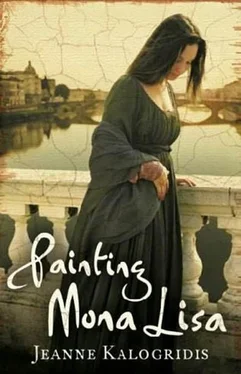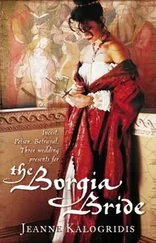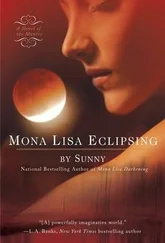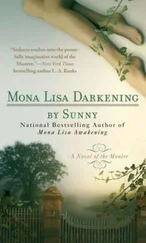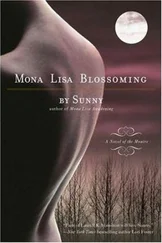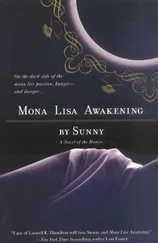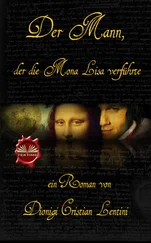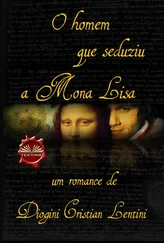I pulled the wool from my ears and said his name. Instinctively, I rose. The sight of him evoked memories of my Giuliano, of Lorenzo. I remembered his letter to Giuliano, advising him of the Duke of Milan’s intentions, and felt grateful. I wanted to embrace him as a dear friend, as a family member.
He felt the same. I saw it in his brilliant if uncertain smile, in his arms, which hung determinedly by his sides but tensed with the desire to rise, touch, enfold. Had he been able, he would have lifted his fingertips to my face and read the contours there. He loved me, and I did not understand why.
Behind him was a window covered by a piece of canvas, cut to the window’s precise dimensions, hung from a rod and attached to ropes which served as pulleys to raise or lower it. At the moment, the canvas was raised, revealing a thick layer of oiled paper-opaque enough to bar all scenery, translucent enough to permit yellow filtered light.
“Please sit,” he said, then gestured to a stool. “May I?” When I nodded, he pulled it across the stone and sat down in front of me.
Behind him stood an easel bearing a large wooden slate; I leaned forward and caught a glimpse of cream-colored paper folded over the top edge of the slate and pressed against the easel to hold it in place. To the left of the easel, a lamp burned on a small table bearing scattered pieces of charcoal and a small pile of downy chicken feathers. On the floor beside it was a basket of eggs, a stoppered bottle of oil, and a few crumpled, stained rags.
“Madonna Lisa,” he said warmly. The robe’s severe black emphasized the hollows of his cheeks. “It has been a long time.” Abruptly, an odd reserve overtook him. The smile faded; his tone grew more formal. “Please forgive the secrecy. It protects you as well as us. I hope Salai did not frighten you.”
Salai : Little Devil. The perfect nickname. I let go the briefest of laughs. “No. Not much.”
He brightened at my amused expression. “Gian Giacomo is his given name, but it hardly suits him. Incorrigible, that boy. He came to me as a street urchin; over the past several years, I have done my best to educate him. He has learned his letters, albeit badly, and makes a passable artist’s apprentice. Still, I despair, sometimes, of ever teaching him more civilized ways. But he is loyal to the death, and thus very useful.” His tone grew kindly. “You look well, Madonna. Motherhood suits you. Salai says you have a fine son.”
“Matteo, yes.” I bloomed.
“A good name. And is he healthy?”
“Very!” I couldn’t contain my enthusiasm. “He eats all the time and wants more. And he is always moving, except when he sleeps…”
“Does he take after you?”
“I think so. His eyes are blue now, like agates, but they’ll darken soon enough, I’m sure. And he has so much hair, so soft, with little curls-I take my finger, like so, at his crown, and make it all twist together in a big ringlet…” I faltered as I caught myself. Francesco’s eyes were icy blue, his hair quite straight. I had almost admitted that my son looked like his father-with curling hair, and eyes that would certainly be dark. I had been on the verge of describing the sweet dimple in his cheek-Giuliano’s dimple.
My tone cooled. “It seems you know a great deal about me and my husband,” I said. “Are you back in Florence? I thought you were at Ludovico’s court in Milan.”
His expression was indecipherable. “I am. But I have come to Florence for a little while, on holiday.”
“And you have brought me here, with all this secrecy, because…?”
He did not answer because Salai arrived with a tray bearing wine, and cheese, and nuts. Leonardo rose and took it, then banished his assistant; he took the tray over to a long, narrow table that covered almost the entire expanse of the wall behind us. He had a good deal of difficulty making enough space to set it down.
I turned, thinking to offer help, and was so fascinated by what I saw that I rose and went over to investigate. On the table were levels and wooden slices with long, sharp edges; heaps of gray-white minever pelts, with holes where the hairs had been painstakingly plucked, one by one, were arranged in heaps next to a pair of scissors. There were piles, too, of feathers-the largest, darkest ones from vultures, the paler ones from geese, the smallest, most delicate from doves-and of translucent, wiry pig bristles. On the far end was a wooden bucket, streaked with lime and covered with a cloth; the floor beneath was speckled with plaster. Near it, in neat, careful rows, small, rolled pellets of color-white, black, yellow-tan, warm pink-lay drying on a cloth beside a large pestle and mortar, which held a few tiny nuggets of brilliant malachite. There was also a large slab of red stone which held a pile of dark yellow-brown powder, a palm-sized grinding stone, and a thin wooden spatula with a sharp edge. A number of paintbrushes were in various stages of construction: a vulture feather had been plucked, the tip cut away. A thick bunch of pig bristles had then been carefully inserted into the opening and tied firmly in place with waxed thread. There were a number of very slender spindle-shaped wooden sticks; one had been inserted into the barrel of the quill so that it could withstand the pressure of an artist’s hand.
“This is a painter’s studio,” I said to myself, delighted.
Leonardo had set the tray down and studied me, amused, as he poured wine into a goblet. “After a fashion; it’s only temporary. The one in Milan is much nicer. Go ahead, touch whatever you like. Please.”
I drew in a breath. I reached for a half-finished brush that wanted a handle. It was made from a dove’s stripped feather; the creator had carefully inserted white minever fur, strand by strand, into the cutaway quill, and trimmed the brush to an impossibly sharp point. I touched the silky tip with my finger and smiled. It was an instrument for painting the finest detail: a single hair, an eyelash.
I set it down and pointed to the dried pellets. The colors were amazingly uniform. “And how are these made? And used?”
He set one goblet down and filled another; my questions pleased him. “You see the ocher there, on the porphyry?” He indicated the powder on the red stone slab. “The best ocher is found in the mountains. I found this in the forests outside of Milan. There, if you dig, you can find veins of white and ocher and sinoper of all shades, from black to a light reddish brown. The mineral is many times washed, then many times ground, until it’s brilliant and pure. Then it is worked up with linseed oil-or water, if one prefers-and dried. This particular black here isn’t sinoper, but from burned almond shells, which makes a very nice, workable color.”
“And this? Is this sinoper?” I pointed at a pink pellet.
“The cinabrese ? It’s made from a mixture of lime white and the very lightest shade of sinoper. For painting flesh. When I’m ready to paint, I crush a bean with linseed oil, as much as I need.” He paused and gave me a strangely curious, shy glance. “I know we have many things to discuss, Madonna. But I had hoped…” He handed me a goblet of wine. I was too nervous to want it, but I accepted it out of courtesy, and took a sip so that he felt free to drink from his own glass. He took a token swallow and set it down. “I had hoped we might relax a bit before launching into difficult subjects. And I had hoped you might consent to sit for me, if only for a little while today.”
“Sit for you?”
“For your portrait.”
I let go a short laugh of disbelief. “What would be the point?” I challenged. “Lorenzo is dead. And Giuliano…” I didn’t finish.
“I would still like to complete the work.”
Читать дальше
Конец ознакомительного отрывка
Купить книгу
